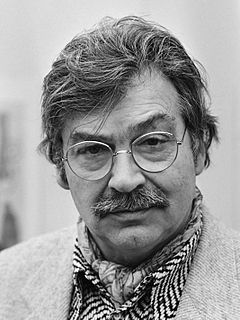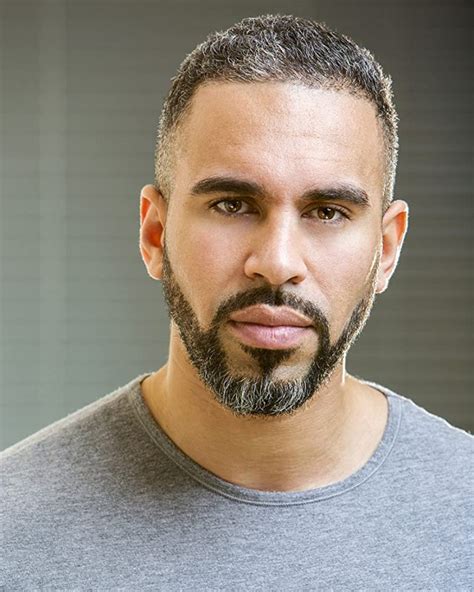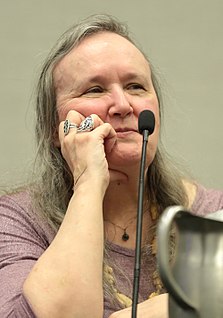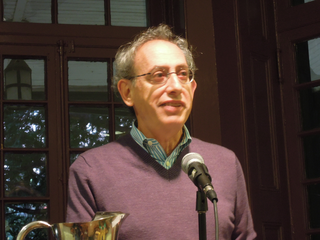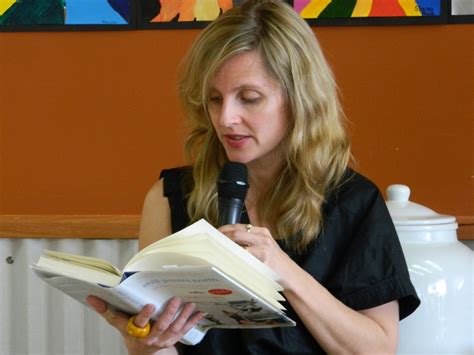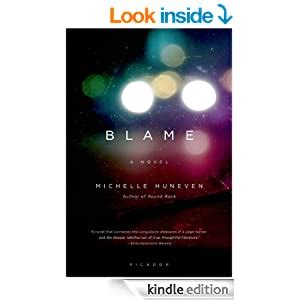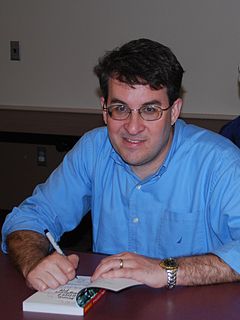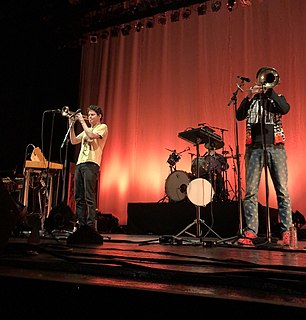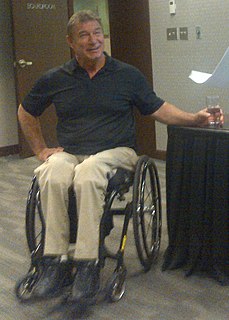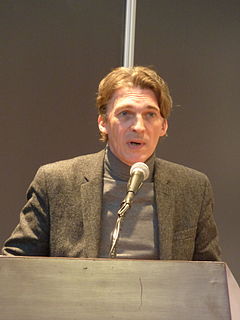Top 470 Translation Quotes & Sayings - Page 8
Explore popular Translation quotes.
Last updated on April 15, 2025.
Of course my books are translated into many languages. I have here, in my home, translations on my shelf of my books into forty-five different languages. Almost none of them I can read. I can read only the English editions. But, I know that a translation of a work of literature is like playing a violin concerto on the piano. You can do this. You can do this very successfully on one strict condition: never try to force the piano to produce the sounds of the violin. This will be grotesque. So, different musical instruments provide for different music.
I did my BA in English lit, and hated the restriction - I'd always read more in translation than not; coming from a working-class background, what I knew of as British literature - the writers who made big prize lists and/or were stocked in WH Smith, Doncaster's only bookshop until I was 17 - seemed incredibly, alienatingly middle-class. Then in 2009, just after the financial crash, I graduated with no more specific skill than 'can analyse a bit of poetry'.
Any time having international interviews is a language barrier, you don't know how much you need to simplify what you're saying for it not to be damaged in translation. But culturally, there are some interesting phenomena. I get the feeling that the way rock music gets described in Germany, it is all like Rolling Stone circa 1975, taken to the 10th power. If you're a rock musician, you're part of the counterculture. Your music is like a critique of everything that is wrong with America.
There are parallels between the 1960s and now, because during the 1960s, people were being slaughtered, their lives were being taken, there was violence, greed, drugs were rising - just all of this. And my uncle was saying, you've got to come back to faith, hope and love. Now, you get the translation and say faith, hope and charity - faith, hope and love.
Rather than thinking of sound and sense in my essays as two opposing principles, two perpendicular trajectories, as they are often considered in conversations around translation, or even as two disassociated phenomena that can be brought together to collaborate with more or less success, I think of sound as sense. Sound has its own meaning, and it's one of the many non-semantic dimensions of meaning in language. I want to emphasize is the formal dynamic between language-as-information and language-as-art-material.
Kaz came to Switzerland where I was teaching to share with me [Heart Sutra] wondrous insight. There he and I worked on this new translation - with my part being to help render it into a verse form that would be good to chant. Since I have worked with many dying people over the years and often share the Heart Sutra with them, I found this new version that we created together to be so much more accessible to those who were facing death.
When you begin to read a poem you are entering a foreign country whose laws and language and life are a kind of translation of your own; but to accept it because its stews taste exactly like your old mother's hash, or to reject it because the owl-headed goddess of wisdom in its temple is fatter than the Statue of Liberty, is an equal mark of that want of imagination, that inaccessibility to experience, of which each of us who dies a natural death will die.
If men were able to be convinced that art is a precise advance knowledge of how to cope with the psychic and social consequences of the next technology, would they all become artist? Or would they begin a careful translation of new art forms into social navigation charts? I am curious to know what would happem if art were suddenly seen for what it is, namely, exact information of how to rearrange one's psyche in order to anticipate the next blow from our own extended faculties.
When I was young I once found a book in a Dutch translation, 'The leaves of Grass'. It was the first time a book touched me by its feeling of freedom and open spaces, the way the poet spoke of the ocean by describing a drop of water in his hand. Walt Whitman was offering the world an open hand (now we call it democracy) and my 'Monument for Walt Whitman' became this open hand with mirrors, so you can see inside yourself.
With action in Hollywood, a choreographer will be hired to design an amazing fight, with all these cool little narrative bits, such as a fighter having to perform a certain move because he's been injured and can only move that way, but it can all get lost in translation because the director then does what he wants with it and then passes it on to the editor, who does his interpretation of the fight. It becomes almost like Chinese whispers, so sometimes the end fight you see on film is so different to how it was conceived and looked on the day.
Pictures are the idea in visual or pictorial form; and the idea has to be legible, both in the individual picture and in the collective context - which presupposes, of course, that words are used to convey information about the idea and the context. However, none of this means that pictures function as illustrations of an idea: ultimately, they are the idea. Nor is the verbal formulation of the idea a translation of the visual: it simply bears a certain resemblance to the meaning of the idea. It is an interpretation, literally a reflection.
With Ibrahim al-Koni, what I figured out was - and you'll see this in his novels - if your time is limited, make the unit of the chapters small so that you can finish one a day, at least in the first draft. Once you have the first draft it's living, and you can coax it to grow and trim it and reshape it and so on. But get that first draft. I think if I'd gone to an MFA program and learned that, it would have been money well spent. But translation has been that for me.
I've never translated more than one book by any author. But I'm fascinated by translators who have, like Richard Zenith, who's translated so much of Fernando Pessoa's work. I get restless for a new kind of influence. The books I've translated are books I want to learn from as a writer, to be intoxicated by. And translation is an act of writing in itself. It's an act of recreation - of a writer's cadence and tone and everything that distinguishes the voice in the book.
Mister Cameron - I have read the unexpurgated Ovid, the love poems of Sappho, the Decameron in the original, and a great many texts in Greek and Latin histories that were not though fit for proper gentlemen to read, much less proper ladies. I know in precise detail what Caligula did to, and with, his sisters, and I can quote it to you in Latin or in my own translation if you wish. I am interested in historical truth, and truth in history is often unpleasant and distasteful to those of fine sensibility. I frankly doubt that you will produce anything to shock me.
...trust in Creation which is made fresh daily and doesn’t suffer in translation. This God does not work in especially mysterious ways. The sun here rises and sets at six exactly. A caterpillar becomes a butterfly. A bird raises its brood in the forest and a greenheart tree will only grow from a greenheart seed. He brings drought sometimes followed by torrential rains and if these things aren’t always what I had in mind, they aren’t my punishment either. They’re rewards, let’s say for the patience of a seed.
I've had the good fortune to read a lot of great American writers in translation, and my absolute beloved, for me one of the greatest writers ever, is Mark Twain. Yes, yes, yes. And Whitman, from whom the whole of 20th-century poetry sprung up. Whitman was the origin of things, someone with a completely different outlook. But I think that he's the father of the new wave in the world's poetry which to this very day is hitting the shore.
Better known as the Secret of the Golden Flower, this is a famous neidan text that the Western world came to know through Richard Wilhelm's 1929 translation. The Chinese text used by Wilhelm was edited by Zhanran Huizhen zi in 1921. Besides this, at least five more versions are available, all of which date to the late Qing dynasty (1644-1911) and are ascribed to Lu Dongbin, who revealed them through spirit writing.
There are certain writers I can't read when I'm trying to write because their voices are so distinct. Cormac McCarthy, he's the most different writer from anything I've ever written, but there's something about those really spare sentences that is just tough - it would be too much of an influence. Grace Paley is my favorite writer. Her stuff is so voice-driven, when I read her a lot I want to make my writing more voice-y and dialogue-heavy. I love a lot of stuff in translation.
I had the advantage, that I know Swedish. So I had the Swedish book and I had a lot of English translations, and German translations, and I did everything to make the best English translation of August Strindberg's Miss Julie I could. And then, there I went. "Oh! I think she's thinking this, but I think she should say it!" And so on. It's wonderful to do that.
This word "description" may be disconcerting when used to refer to what is generally called a translation. But when one wishes to render a verbal creation (as opposed to a didactic statement) from one language to another, he is confronted with two equally unsatisfactory choices. He may, according to his talents, elaborate a similar, but never identical creation, or he may describe that creation as completely as possible in his own language.
The word mantra comes from two Sanskrit words man, ("to think") and tra ("tool'). So the literal translation is "a tool of thought." And that's how mantras are used in Buddhist and Hindu practices, as tools that clear your mind of distractions. Because when you focus on repeating that mantra over and over again, soon the noise will die down and all you will hear is your inner voice.
You get another person who operates only in an African language and there are many persons who operate only in African languages; he or she is excluded from all the goodies that come with English. And even in terms of justice, law codes, the legal system. A person who does not know English in Africa is excluded from that system because he can only operate through acts of translation.
In the years since The Life and Extraordinary Adventures of Private Ivan Chonkin, Voinovich has sharpened his satire, and Monumental Propaganda is a novel that slashes and rips -- but not on every page. He expands his narrative to accommodate shrewd philosophy and inventive portraiture, a very amusing disquisition on Soviet latrines and a number of outlandish plot developments. In his translation, Andrew Bromfield deftly shifts his tone and tools as required, remaining true to Voinovich's Vonnegut-like playfulness and appreciation of the absurd.
One of the producers, Wonjo, was an amazing interpreter. I don't think we really knew how it was going to work at the beginning. Yet it was something that a couple of days into it seemed so seamless and it wasn't something that we noticed or thought about. A couple of times I cornered him and forced him to speak English but we didn't speak much English at all. That said, I don't think anything was ever lost in translation. It was all very easy.
Al-Ghazali is the most important philosophical theologian of classical Islam, and Moderation in Belief is among his most important works. It sets out al-Ghazali's Ash?arite theology with unusual clarity and provides important background for such well-known works as his autobiographical Deliverance from Error and his attack on Avicenna in The Incoherence of the Philosophers. This first English-language translation, with notes that bring out the argumentation and background of the work, is thus very much to be welcomed.
Khairani Barokka is a writer, spoken-word poet, visual artist and performer whose work has a strong vein of activism, particularly around disability, but also how this intersects with, for example, issues of gender - she's campaigned for reproductive rights in her native Indonesian, and is currently studying for a PhD in disability and visual cultures at Goldsmiths. She's written a feminist, environmentalist, anti-colonialist narrative poem, with tactile artwork and a Braille translation. How could I not publish that?
Pour e crire ce livre essentiel, le seul livre vrai, un grand e crivain n'a pas, dans le sens courant, a' l'inventer puisqu'il existe de j a' en chacun de nous, mais a' le traduire. To write the essential book, the only true book, a great writerdoesnot needto invent becausethebook already exists inside each one of us and merely needs translation.
Penning an advice column for the literary website The Rumpus, [Strayed] worked anonymously, using the pen name Sugar, replying to letters from readings suffering everything from loveless marriages to abusive, drug-addicted brothers to disfiguring illnesses. The result: intimate, in-depth essays that not only took the letter writer's life into account but also Strayed's. Collected in a book, they make for riveting, emotionally charged reading (translation: be prepared to bawl) that leaves you significantly wiser for the experience. . . . Moving. . . . compassionate.
I read a lot. I always have, but in those two years I gorged myself on books with a voluptuous, almost erotic gluttony. I would go to the local library and take out as many as I could, and then lock myself in the bedsit and read solidly for a week. I went for old books, the older the better - Tolstoy, Poe, Jacobean tragedies, a dusty translation of Laclos - so that when I finally resurfaced, blinking and dazzled, it took me days to stop thinking in their cool, polished, crystalline rhythms.
Its subtlest, most appealing accomplishment may be in how other characters respond to Gregorius' precipitous swerve onto the spiritual path. (...) That said, Night Train to Lisbon is a very long, ambitious book that's feverishly overwritten. (...) Think of W.G. Sebald recast for the mass market: stripped of nuance, cooked at high temperature and pounded home, clause after clause. Some of the clumsiness derives from Barbara Harshav's inelegant translation -- we're often aware of her struggle -- but she can't be blamed for the pervasive bloat.
Consider the Koran... this wretched book was sufficient to start a world-religion, to satisfy the metaphysical need of countless millions for twelve hundred years, to become the basis of their morality and of a remarkable contempt for death, and also to inspire them to bloody wars and the most extensive conquests. In this book we find the saddest and poorest form of theism. Much may be lost in translation, but I have not been able to discover in it one single idea of value.
Non est, crede mihi, sapientis dicere 'Vivam':
Sera nimis vita est crastina: vive hodie.
Believe me, wise men don't say 'I shall live to do that', tomorrow's life is too late; live today.
Variant translation: Tomorrow will I live, the fool does say; Today itself's too late; the wise lived yesterday.
The language of all the interpretations, the translations, of the Judaic Bible and the Christian Bible, is musical, just wonderful. I read the Bible to myself; I'll take any translation, any edition, and read it aloud, just to hear the language, hear the rhythm, and remind myself how beautiful English is.
He took a bite, swallowed. "God. If asparagus tasted like that all the time, I'd be vegetarian, too." Some people in a lacquered wooden boat approached us on the canal below. One of them, a woman with curly blond hair, maybe thirty, drank from a beer then raised her glass towards us and shouted something. "We don't speak Dutch," Gus shouted back. One of the others shouted a translation: "The beautiful couple is beautiful.
It skims in through the eye, and by means of the utterly delicate retina hurls shadows like insect legs inward for translation. Then an immense space opens up in silence and an endlessly fecund sub-universe the writer descends, and asks the reader to descend after him, not merely to gain instructions but also to experience delight, the delight of mind freed from matter and exultant in the strength it has stolen from matter.
Whenever I visit Korea she [Kang] buys me lunch and takes me to a gallery. As if all this wasn't enough, she has incredible respect for translation as a creative, artistic practice - she insists that each English version is 'our book', offered to share her fees with me when she found out I wasn't getting paid for translating her publicity stuff, always asks the editor to credit me, and does so herself whenever she's interviewed. Too good to be true.
A 1998 study was done in Hebrew by an Israeli scholar, Yosef Grodzinsky, and the English translation of the title is Good Human Material. That's what they wanted sent to Palestine for colonization and for the eventual conflict that took place some years later. These policies were somewhat complementary to the U.S. policy of pressuring England to allow Jews to go to Palestine, but not allowing them here. The British politician Ernest Bevin was quite bitter about it, asking, "if you want to save the Jews, why send them to Palestine when you don't admit them?"
Truth is a mobile army of metaphors, metonyms, anthropomorphisms, in short a sum of human relations which have been subjected to poetic and rhetorical intensification, translation and decoration […]; truths are illusions of which we have forgotten that they are illusions, metaphors which have become worn by frequent use and have lost all sensuous vigour […]. Yet we still do not know where the drive to truth comes from, for so far we have only heard about the obligation to be truthful which society imposes in order to exist" from, "On Truth and Lying in a Non-Moral Sense".
If a little less time was devoted to the translation of letters by Julius Caesar describing Britain 2000 years ago and a little more time was spent on teaching children how to describe (in simple modern English) the method whereby ethylene was converted into polythene in 1933 in the ICI laboratories at Northwich, and to discussing the enormous social changes which have resulted from this discovery, then I believe that we should be training future leaders in this country to face the world of tomorrow far more effectively than we are at the present time.
He said he "admired our courage" but didn't want to see us do anything to "damage our promising futures." He felt "proud as an American" that we had "exercised our right to peaceful free expression." But if we did it again, he didn't "know what action the state board of education might take against individual students." Translation: You've had your fun. Now sit down, shut up, and take the freakin' test. Or else.
One of the things I love about translation is it obliterates the self. When I'm trying to figure out what Tu Fu has to say, I have to kind of impersonate Tu Fu. I have to take on, if you will, his voice and his skin in English, and I have to try to get as deeply into the poem as possible. I'm not trying to make an equivalent poem in English, which can't be done because our language can't accommodate the kind of metaphors within metaphors the Chinese written language can, and often does, contain.
How truly language must be regarded as a hindrance to thought, though the necessary instrument of it, we shall clearly perceive on remembering the comparative force with which simple ideas are communicated by signs. To say, "Leave the room," is less expressive than to point to the door. Place a finger on the lips is more forcible than whispering, "Do not speak." A beck of the hand is better than, "Come here." No phrase can convey the idea of surprise so vividly as opening the eyes and raising the eyebrows. A shrug of the shoulders would lose much by translation into words.
I didn't realize how different our band's senses of melody actually were. I would write a part that just made perfect sense to me, but for them, it was mind-boggling. Likewise, they could play stuff with relative ease that I never could have. If there was something lost in translation melodically, it wouldn't work at all - we'd just be 17 people in a giant room staring awkwardly at each other. When that happened, I'd go home, figure out what was wrong, fix it, and then return to smooth sailing.
Thanks to the ongoing support of the Government of Ontario, RHF, in partnership with the Ontario Neurotrauma Foundation, has galvanized Ontario’s best researchers, clinicians and scientists to accelerate the translation of the most promising research into practical solutions. This commitment enables the ongoing leveraging of federal, provincial and private sector funds to allow Canadian SCI researchers to embark on a national and global collective journey towards making a difference in the lives of people with spinal cord injury and other disabilities.
It's not a natural translation, transition, to take something from stage to screen. Onstage your action is communicated through the spoken word primarily, and on screen it's communicated through pictures. So it's always been kind of unnatural to take something that lives on the stage and turn it into moving pictures.
Darius didn't have any trouble finding the Street Cats building. It was a cozy-looking square brick building with big front windows crowded with cat stuff. I made a mental note to pick up a little something for Nala from their gift shop. My cat was grumpy enough without her thinking that I'd been cheating on her (translation: I would smell like a zillion other cats) and hadn't even brought her a present.
Artists are looking for a new modernity that would be based on translation: What matters today is to translate the cultural values of cultural groups and to connect them to the world network. This “reloading process” of modernism according to the twenty-first-century issues could be called altermodernism, a movement connected to the creolisation of cultures and the fight for autonomy, but also the possibility of producing singularities in a more and more standardized world.
Not that I ever felt the necessity of proving that all human beings suffer the same way, feel joy the same way, but it happened on my way - when I get close to these people, just by the simple intervention of translation I can actually reach them and ask them something, and their reaction is as I expected. I see that the relationship goes so smoothly, and I realize that cultural languages and specificities are nothing but simple obstacles that you can easily overcome. It's obvious that human beings are the same wherever they are.









